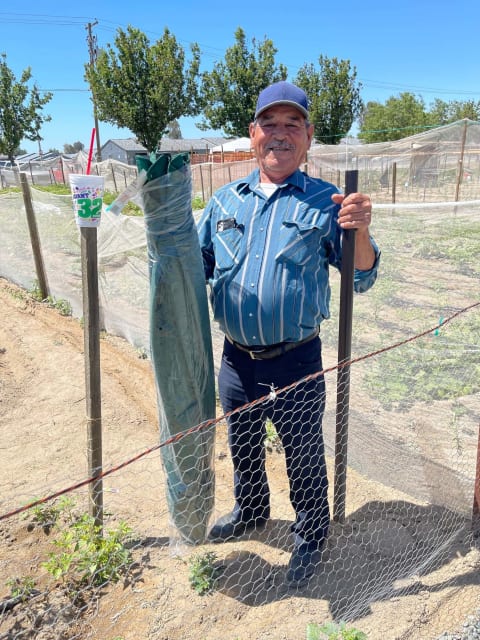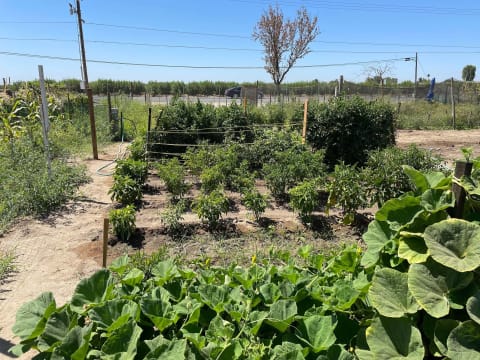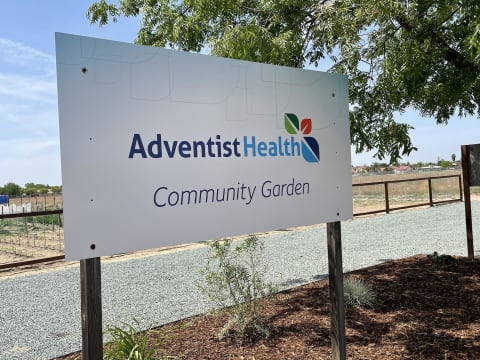
Healing Takes Root
Story 124

Jesus Hernandez has worked in fields and gardens for most of his life.
At 70 years old, some people might think he would be tired of it: the work, the Central Valley heat, and being on his feet.
But he isn’t. These days, in what can only be considered his golden years, Jesus spends his leisure time working in the fields at the Adventist Health Community Garden in Delano. For nine years, he says it has been an escape for him — a reprieve from the stresses of home life and an opportunity to connect with his community.
At the garden, Hernandez plants what he wishes; harvests what he sows to put healthy food on his family table; and cares for his garden how he sees fit. Some people might just see a field of dirt, but to Hernandez, it’s a 20-by-30-foot plot of freedom off Garces Highway.
“For me, it’s very good,” Hernandez says through a translator.
The Adventist Health Community Garden in Delano has for years offered plots of land to residents so they can plant and harvest healthy fruits and vegetables free of charge. It’s an initiative dreamed up as a way to encourage healthy diets while combating food insecurity, but the garden offers more than just greens. It offers community.
The garden offers more than just greens. It offers community.

Adventist Health offers 105 plots of land on a first-come, first-served basis nine months out of the year. Demand is high. All 105 plots are occupied, says Jackie Cortez, Community Outreach Associate at Adventist Health Delano.
The 105 gardeners plant and harvest a cornucopia of fruits and vegetables. On any given day, the garden boasts bountiful plots of squash, tomatoes, cabbage, lettuce, watermelon, onions, pumpkins, eggplants, peppers, and tomatillos. Others plant herbs like thyme, dill, chives, rosemary, and other aromatics for sopas.
"The Adventist Health Community Garden doesn't just fill our community members’ plates with healthy fruits and vegetables," says Matthew Cauthron, Director of Community Integration at Adventist Health Delano. “It fills their souls.”
“I love being out there — for my exercise, my health, and my well-being.”

Cortez, a former social worker, says every relationship she has forged with the gardeners has been meaningful. She recounts Juan, a gardener undergoing dialysis who began coming to the garden at his brother’s urging as a reason to get up in the morning. She thinks about Eufemia, who gardens as a way to put extra food on the table. She considers the gardeners who are disabled and come to the garden so they have somewhere to go "instead of being home and depressed."
“It’s therapeutic for a lot of people,” Cortez adds.
It’s therapeutic for Hernandez. While tending his crops, he jokes with his neighbors in the garden, asking them about their day and how their harvest is going. It’s light conversation — a welcome departure, he says, from the difficult realities of his home life. His adult son has been sick for more than a decade, diagnosed in 2010 with schizophrenia.
It has kept Hernandez healthier, too, he says. He gets his exercise working in the garden; the conversation with his neighbors is his therapy; and the vegetables he brings home that his daughters prepare for him helps him maintain a healthy diet. His favorite? A simple squash dish, or eggplant so fresh that he eats it boiled with a spoon. He also mentions the salsa his family makes. Last year, Hernandez harvested more than 100 pounds of tomatillos that he froze and enjoyed through February.
“Tomatillo verde con barbacoa,” he says with satisfaction.
Hernadez says his daughters are proud of him because they’re able to enjoy food that they know he’s responsible for from seed to table. If he could be in the garden year-round, he would. He says he would plant winter vegetables, like lettuce, cabbage, and strawberries.
“I love being out there,” Hernandez says, “for my exercise, my health, and my well-being.”
Related stories

Somos | "We Are"

Rebuilding Lives

Connect Live | February 24, 2022

Dustin Aho

Jennifer Stemmler

Jackie Liebowitz

Seeds of Change

Emily Groff

Connect Live @ Adventist Health | October 7, 2021

Hope for a Healthier Future

A Lasting Gift
